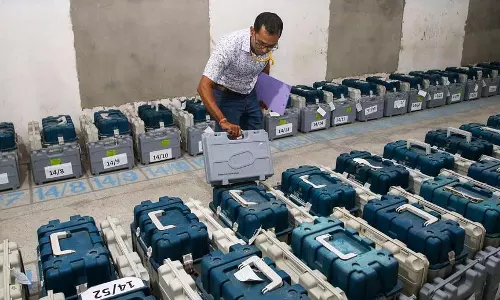
Signaling positive hope for Cuba and the US
text_fieldsUS President Barack Obama and Cuban President Raul Castro held their first formal meeting on Sunday after more than half a century of official hostility agreeing to move ahead for the normalization of ties between the two nations and signaling a positive hope.
The historic meeting took place at the Panama City convention centre during the Summit of the Americas, attended by the leaders of North, Central and South America. The seventh summit is the first which Cuba is attending. Both US and Cuba have barely been on speaking terms, officially for the last fifty years making the highest level talks between the leaders of both nations highly significant. Obama and Raul Castro, successor and brother of Fidel Castro, exchanged handshakes that was captured by the media and both the leaders held a 30-minute talk. Obama’s decision to improve the relations between the US and Cuba resulted in the diplomatic thaw that was unanimously welcomed by the leaders of the world countries. While the US President said that both nations could end the antagonism of the Cold War era and were focusing on the future, Castro said that he was looking forward towards a “new beginning” with the US despite a “long and complicated history.”
The Fidel Castro and his brother Raul toppled the US-backed President Fulgencio Batista in 1959 following which the relations between US and Cuba deteriorated. The Castro brothers formed a revolutionary socialist state with close ties with the Soviet Union. Cuba was a cold war alley of the Soviet Union and the rivalries with the US almost led to a third world war during the Cuban Missile Crisis in 1962. That was when the US spy aircrafts found that Soviet Union had planted missiles in Cuba in the same year. The then US President John F. Kennedy and the Soviet Union under Nikita Khrushchev challenged each other for the next twelve days. The Soviet Union planted missiles in Cuba fearing attacks from the US. It decided to withdraw the missiles following the request by Castro only when the US agreed to pull out the armaments planted in Turkey, a NATO member.
Even though both the countries abstained from the war much to the relief of the world nations, the retaliatory attempts against Cuba was continued through tough sanctions and severing of diplomatic relations. George W Bush’s US travel sanctions in 2003 stifled Cuba immensely. The only communist country in the American continent literally vanished from the face of the earth. But Fidel Castro, relentlessness resisted the hardships and famine and Cuba stood unshakable with unmatched valour. Finally in 2007, Raul Castro initiated steps for amicable relations with the US. Obama partly withdrew the sanctions two years later signaling positive changes.
The two leaders exchanging handshakes during the funeral ceremony of Nelson Mandela in 2013 dominated the headlines. The business ties were resumed, travel sanctions eased and diplomatic relations were recommenced. Obama is expected to announce the removal of Cuba from the United States' list of countries that sponsor terrorism, a major step towards building the ties. Despite the move, the inevitable changes that occurred in both the nations could not be neglected. The economic relations between both the countries too are likely to resume. The analysts predict that Cuba’s hard attained economic stability and solidity would then be lost. Cuba just like China is likely to change soon into a domain of Red Capitalism.























